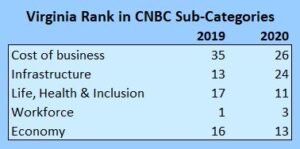As corporate America becomes more woke, placing ever greater emphasis on the diversity of its workforce and executive management ranks, it should come as no surprise that CNBC, which is part of the NBCUniversal corporate media complex, has incorporated wokeness into its annual ranking of Top States for Business.
“We have expanded our measures of inclusiveness, looking more deeply at protections against discrimination, as well as at voting rights and current efforts to expand or restrict access to the polls, based on legislation enacted as of June 1, 2021,” says CNBC in explaining its methodology for ranking the 50 states — in which Virginia scored the top spot for the second year in a row.
Democrats and their allies in the media are crowing about Virginia’s No. 1 ranking this year, the top spot nationally for the second year running. “Virginia Republicans have been warning Democratic control was bad for business,” states the headline of a Virginia Mercury article this morning. “CNBC disagrees.” It turns out that legislation criticized by Republicans as bad for business, continues the story, “actually helped the state’s business reputation.”
I am skeptical. But it’s a hypothesis that Republicans, conservatives, and free marketeers need to consider. Have corporations become so woke that they are adjusting their capital-allocation algorithms in favor of politically progressive states? Or is CNBC so encapsulated in the left-wing media bubble that it has become unplugged from reality?
First, we need to understand how CNBC compiles its rankings. Its methodology starts by identifying the qualities that the states themselves deem most important in attracting business. CNBC does not query corporations, which are doing the investing, it is analyzing states’ economic development marketing materials.
We assign a weight to each category based on how hard the states are pushing it in their economic development marketing. We determine that by analyzing every state’s economic development web site. If, for example, more states are pitching their low business costs, Cost of Doing Business carries more possible points.
This is not illogical on its face. Presumably, states are touting the features they expect will most resonate with businesses. But this is not the same as asking businesses themselves.
For example, the Virginia Industry Foundation published in November the “Virginia MFG Competitive Index,” which ranks Virginia 11th nationally as the most competitive manufacturing location, up from 15th previous year. Virginia Manufacturing Association members developed the criteria and selected metrics based on what they themselves think is important. Factors such as highway accessibility and availability of the labor force were at the top of the list. Social equity metrics were not even on the list.
Be that as it may, CNBC looks to state economic development offices for guidance. To see what Virginia’s economic developers are touting, visit the website of the Virginia Economic Development Partnership, arguably one of the top economic development organizations in the country. Here’s what VEDP is selling:
- America’s top state for talent. Virginia’s premier talent base makes for a world-class labor pool ready to meet business needs in all key employee profiles. Across industries, Virginia’s workforce is one of the most productive and educated populations in the country – 38% of the population has a bachelor’s degree or higher.
- Unparalleled livability. Virginia’s diversity and natural beauty are simply unparalleled. With access to a variety of outdoor amenities both in cities and picturesque small towns as well as thriving urban centers alive with arts and culture, Virginians throughout the Commonwealth have a vibrant quality of life.
- Advantageous location and infrastructure. Strategically located on the U.S. East Coast and adjacent to Washington, D.C., Virginia’s integrated transportation system of highways, railroads, airports, and seaports provide logistical advantages for companies in every industry.
- Business climate advantage. Virginia offers the right environment for business success. Since 1972, the Commonwealth has had a stable 6% corporate income tax, lower than the national median of 6.5%. Virginia has also maintained a AAA rating since 1938, longer than any other state.
There’s nothing on the VEDP website about social justice, much less alterations to election law. If CNBC found that states are emphasizing social justice as a business selling point, they certainly didn’t get it from Virginia’s economic development website. One might argue that social justice is implicit in workforce and education statistics — no state will rate highly if a large segment of the population is deprived of the opportunity to develop workforce skills. But CNBC already captures that from its workforce statistics. Now it is counting factors that have no bearing on workforce preparedness at all.
The 2021 session of the General Assembly enacted a slew of labor laws — see Steve Haner’s discussion here — that have been in force for literally two weeks only. It is way too early to proclaim that the measures have had a positive or negative impact on Virginia’s business climate. Give it another year, and we’ll be in a better position to judge. For now, it’s way too early to view Virginia’s No. 1 ranking in the latest CNBC scoring as a validation of Northam administration economic policy.


Leave a Reply
You must be logged in to post a comment.